金融经济文献综述毕业学术论文写作英文英语
介绍金融专业英文作文

介绍金融专业英文作文英文,As a finance major, I have always been fascinated by the world of money and investments. The field of finance is incredibly diverse, covering everything from personal finance to corporate finance to global financial markets. In my studies, I have learned about financial analysis,risk management, portfolio management, and many other important topics.One of the most interesting aspects of finance is the way it intersects with other fields. For example, finance and economics are closely related, as both deal with the allocation and management of resources. Finance also intersects with accounting, as financial statements are a key tool for understanding a company's financial health. And in today's global economy, finance plays a crucial role in international trade and investment.But perhaps the most exciting thing about finance is the potential for making money. Of course, this is not theonly reason to study finance, but it is certainly a motivating factor for many students. In my own experience,I have found that the skills and knowledge I have gained in my finance courses have been invaluable in my personal investments and financial planning.Overall, I believe that finance is a fascinating and rewarding field that offers many opportunities for growth and success. Whether you are interested in personal finance, corporate finance, or global financial markets, there is something for everyone in this dynamic and ever-changing field.中文,作为一名金融专业的学生,我一直对金融和投资领域感到着迷。
关于金融的英语作文带翻译
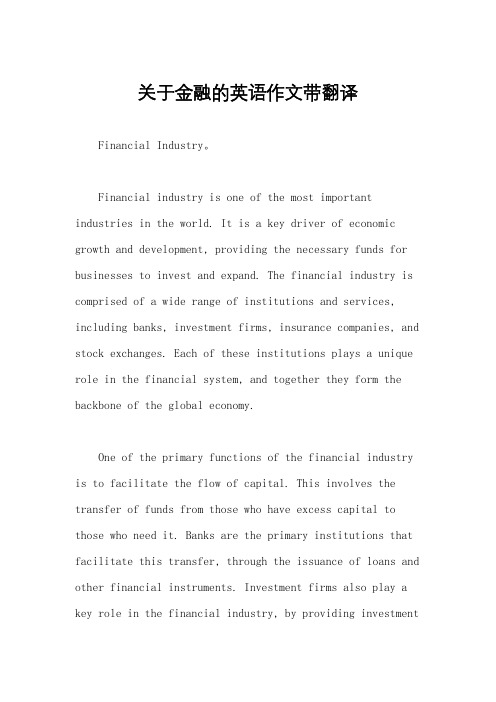
关于金融的英语作文带翻译Financial Industry。
Financial industry is one of the most important industries in the world. It is a key driver of economic growth and development, providing the necessary funds for businesses to invest and expand. The financial industry is comprised of a wide range of institutions and services, including banks, investment firms, insurance companies, and stock exchanges. Each of these institutions plays a unique role in the financial system, and together they form the backbone of the global economy.One of the primary functions of the financial industry is to facilitate the flow of capital. This involves the transfer of funds from those who have excess capital to those who need it. Banks are the primary institutions that facilitate this transfer, through the issuance of loans and other financial instruments. Investment firms also play a key role in the financial industry, by providing investmentopportunities for individuals and institutions. These firms manage investment portfolios on behalf of their clients, and help to diversify their investments across a range of asset classes.Insurance companies are another important component of the financial industry. They provide protection against financial losses due to unforeseen events, such as accidents, natural disasters, and illness. Insurance policies are designed to transfer risk from the policyholder to the insurance company, providing peace of mind and financial security.The stock market is also a critical component of the financial industry. It provides a platform for companies to raise capital by issuing shares of stock to investors. Investors can then buy and sell these shares on the open market, providing liquidity and price discovery. The stock market also provides a barometer of economic activity, reflecting the overall health of the economy and the performance of individual companies.In recent years, the financial industry has undergone significant changes and challenges. The global financial crisis of 2008 exposed weaknesses in the financial system, leading to increased regulation and oversight. The rise of financial technology, or fintech, has also disrupted traditional financial institutions by providing new ways of accessing financial services and products.Despite these challenges, the financial industry remains a critical component of the global economy. It plays a vital role in providing the necessary funds for businesses to grow and innovate, and in protecting individuals and institutions against financial risks. As the world becomes increasingly interconnected and complex, the financial industry will continue to evolve and adapt to meet the needs of a changing world.。
金融学术作文英文

金融学术作文英文英文:As a finance student, I have come across various academic writings that have helped me understand the intricacies of the financial world. In my opinion, academic writing in finance should be clear, concise, and informative. It should provide a detailed analysis of the topic while also being easy to understand for the average reader. Academic writing should not only includetheoretical concepts but also practical examples that can help readers understand how these concepts apply in thereal world.One of the key aspects of academic writing in finance is the use of technical jargon. While it is important to use technical terms to convey specific meanings, it is equally important to ensure that the reader can understand the meaning of these terms. Therefore, it is important to strike a balance between using technical terms andexplaining them in simple language.Another important aspect of academic writing in finance is the use of data and statistics. In finance, data and statistics play a crucial role in understanding the market trends and making informed decisions. Therefore, academic writing should include relevant data and statistics to support the arguments and conclusions.In addition, academic writing in finance should also be well-structured and organized. The introduction should provide a brief overview of the topic, the body should provide a detailed analysis, and the conclusion should summarize the key points and provide recommendations for future research.中文:作为一名金融学生,我接触过各种学术著作,这些著作帮助我理解了金融世界的复杂性。
金融英语范文
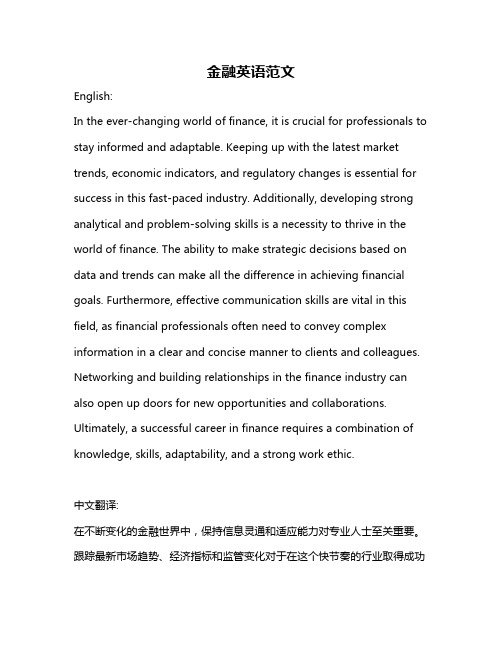
金融英语范文English:In the ever-changing world of finance, it is crucial for professionals to stay informed and adaptable. Keeping up with the latest market trends, economic indicators, and regulatory changes is essential for success in this fast-paced industry. Additionally, developing strong analytical and problem-solving skills is a necessity to thrive in the world of finance. The ability to make strategic decisions based on data and trends can make all the difference in achieving financial goals. Furthermore, effective communication skills are vital in this field, as financial professionals often need to convey complex information in a clear and concise manner to clients and colleagues. Networking and building relationships in the finance industry can also open up doors for new opportunities and collaborations. Ultimately, a successful career in finance requires a combination of knowledge, skills, adaptability, and a strong work ethic.中文翻译:在不断变化的金融世界中,保持信息灵通和适应能力对专业人士至关重要。
关于金融的英语作文模板

关于金融的英语作文模板Title: An Essay Template on Finance。
Introduction。
Finance is a crucial aspect of any economy, as it involves the management of money and other assets. It plays a significant role in the allocation of resources, investment decisions, and the overall functioning of the economy. In this essay, we will explore the key concepts and principles of finance, including the role of financial institutions, the importance of financial markets, and the impact of monetary policy.Financial Institutions。
Financial institutions, such as banks, credit unions, and insurance companies, play a vital role in the economy by providing financial services to individuals, businesses, and governments. They facilitate the flow of funds from savers to borrowers, which helps to promote economic growth and development. Banks, for example, accept deposits from customers and lend money to individuals and businesses, thereby enabling them to make investments and purchases. Insurance companies, on the other hand, provide protection against various risks, such as accidents, illness, and natural disasters, by pooling resources and spreading the financial burden among policyholders.Financial Markets。
金融学术作文英文
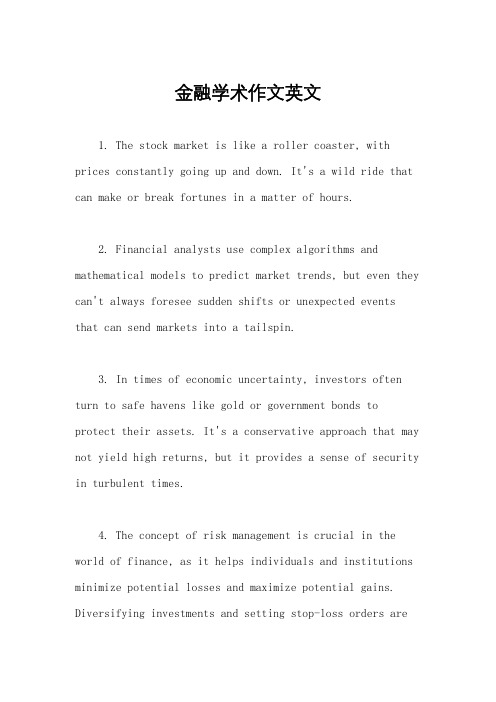
金融学术作文英文1. The stock market is like a roller coaster, with prices constantly going up and down. It's a wild ride that can make or break fortunes in a matter of hours.2. Financial analysts use complex algorithms and mathematical models to predict market trends, but even they can't always foresee sudden shifts or unexpected eventsthat can send markets into a tailspin.3. In times of economic uncertainty, investors often turn to safe havens like gold or government bonds to protect their assets. It's a conservative approach that may not yield high returns, but it provides a sense of security in turbulent times.4. The concept of risk management is crucial in the world of finance, as it helps individuals and institutions minimize potential losses and maximize potential gains. Diversifying investments and setting stop-loss orders arejust a few strategies used to mitigate risk.5. Behavioral finance explores how human psychology influences financial decision-making. Emotions like fear and greed can lead to irrational choices that may not be in one's best interest. Understanding these biases can help investors make more informed decisions.6. The global economy is interconnected, with events in one country having ripple effects around the world. A trade war between two major powers can disrupt supply chains, impact consumer confidence, and ultimately affect stock prices on a global scale.7. Financial literacy is essential for individuals to navigate the complex world of money management. Understanding concepts like compound interest, inflation, and asset allocation can help people make informed decisions about saving, investing, and planning for the future.8. The rise of cryptocurrencies like Bitcoin haschallenged traditional notions of money and finance. While some see them as the future of currency, others warn of their volatility and lack of regulation. Only time will tell how they will shape the financial landscape.。
金融综合英语作文考试范文
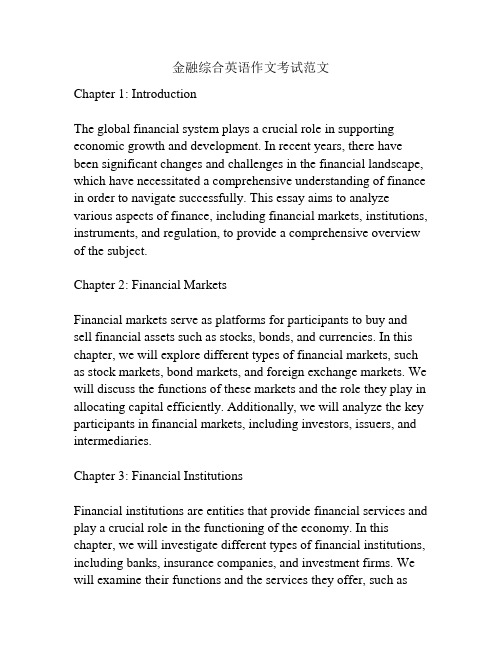
金融综合英语作文考试范文Chapter 1: IntroductionThe global financial system plays a crucial role in supporting economic growth and development. In recent years, there have been significant changes and challenges in the financial landscape, which have necessitated a comprehensive understanding of finance in order to navigate successfully. This essay aims to analyze various aspects of finance, including financial markets, institutions, instruments, and regulation, to provide a comprehensive overview of the subject.Chapter 2: Financial MarketsFinancial markets serve as platforms for participants to buy and sell financial assets such as stocks, bonds, and currencies. In this chapter, we will explore different types of financial markets, such as stock markets, bond markets, and foreign exchange markets. We will discuss the functions of these markets and the role they play in allocating capital efficiently. Additionally, we will analyze the key participants in financial markets, including investors, issuers, and intermediaries.Chapter 3: Financial InstitutionsFinancial institutions are entities that provide financial services and play a crucial role in the functioning of the economy. In this chapter, we will investigate different types of financial institutions, including banks, insurance companies, and investment firms. We will examine their functions and the services they offer, such asdeposit-taking, lending, underwriting, and asset management. Furthermore, we will analyze the risks faced by financial institutions and the regulatory measures in place to mitigate these risks.Chapter 4: Financial Instruments and RegulationFinancial instruments are contracts that represent a claim on certain economic resources or cash flows. In this chapter, we will delve into various types of financial instruments, such as stocks, bonds, derivatives, and commodities. We will examine their characteristics, valuation methods, and risk-return profiles. Moreover, we will explore the importance of financial regulation in safeguarding the stability and integrity of financial markets. We will discuss the role of regulatory bodies, such as central banks and financial supervisory authorities, in overseeing financial institutions and ensuring compliance with relevant rules and regulations.ConclusionIn conclusion, finance is a multidimensional subject that encompasses financial markets, institutions, instruments, and regulation. A comprehensive understanding of these aspects is crucial for individuals and organizations operating in the global financial system. By examining the various dimensions of finance, this essay has aimed to provide a comprehensive overview of the subject. By acquiring knowledge in these areas, individuals and organizations can make informed decisions and navigate the complexities of the financial landscape more effectively.Chapter 5:Financial Analysis and Decision MakingFinancial analysis is the process of evaluating the financial health and performance of an individual, company, or investment opportunity. In this chapter, we will explore the different methods and tools used in financial analysis, such as ratio analysis, trend analysis, and cash flow analysis. We will discuss how these techniques are utilized to assess profitability, liquidity, solvency, and efficiency.Furthermore, financial decision-making is a critical aspect of finance. This chapter will delve into the principles and techniques used in financial decision-making, such as capital budgeting, cost of capital analysis, and risk management. We will discuss the importance of evaluating investment opportunities, determining optimal capital structure, and managing risk to maximize shareholder value.Chapter 6: International FinanceIn an increasingly interconnected world, international finance has become a vital component of the global financial system. This chapter will examine the key concepts and issues in international finance, such as exchange rates, balance of payments, and international capital flows. We will discuss the role of international financial institutions, such as the International Monetary Fund (IMF) and the World Bank, in promoting global financial stability and facilitating international trade and investment. Additionally, we will explore the challenges and opportunities ininternational financial management for multinational corporations (MNCs). We will analyze the various strategies and techniques utilized by MNCs to manage foreign exchange risk, financing, and expansion into international markets. We will also discuss the impact of political and economic factors on international finance and the role of international financial regulations in governing cross-border transactions.Chapter 7: Corporate FinanceCorporate finance focuses on the financial decisions made by corporations to maximize shareholder value. In this chapter, we will examine the principles and techniques of corporate finance, including capital budgeting, cost of capital, dividend policy, and working capital management. We will discuss the importance of financial planning, forecasting, and budgeting in corporate finance decision-making.Moreover, this chapter will delve into corporate governance and the role of financial markets and institutions in influencing corporate behavior. We will explore topics such as agency theory, shareholder activism, and executive compensation. Additionally, we will analyze the role of corporate finance in mergers and acquisitions, initial public offerings, and corporate restructuring.ConclusionIn conclusion, the study of finance encompasses a wide range of topics, including financial markets, institutions, instruments, regulation, analysis, decision-making, international finance, andcorporate finance. Understanding these areas is crucial for individuals and organizations to effectively manage their finances, evaluate investment opportunities, and navigate the complexities of the global financial system. By acquiring knowledge and skills in finance, individuals can make informed financial decisions, mitigate risks, and achieve their financial goals. Similarly, organizations can optimize their financial performance, allocate capital efficiently, and create value for their shareholders.。
金融的英语作文带翻译
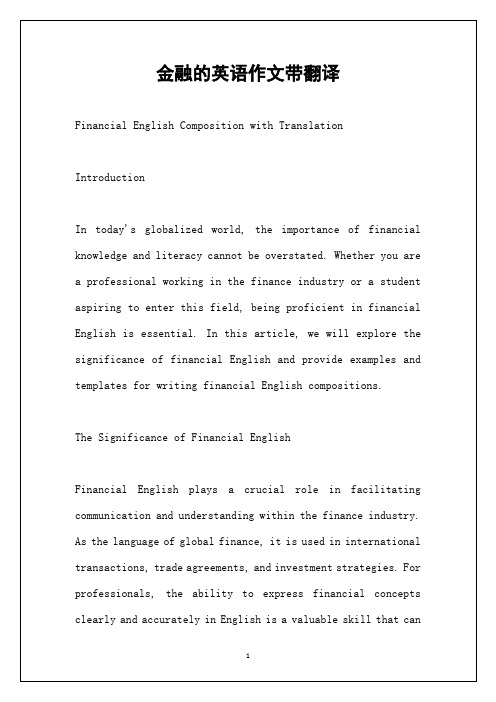
Body Paragraphs: Present key points, analysis, and supporting evidence.
The Significance of Financial English
Financial English plays a crucial role in facilitating communication and understanding within the finance industry. As the language of global finance, it is used in international transactions, trade agreements, and investment strategies. For professionals, the ability to express financial concepts clearly and accurately in English is a valuable skill that canenhance career opportunities and promote business success. Additionally, for students and researchers, mastering financial English is essential for accessing and understanding a wide range of academic literature and resources.
- 1、下载文档前请自行甄别文档内容的完整性,平台不提供额外的编辑、内容补充、找答案等附加服务。
- 2、"仅部分预览"的文档,不可在线预览部分如存在完整性等问题,可反馈申请退款(可完整预览的文档不适用该条件!)。
- 3、如文档侵犯您的权益,请联系客服反馈,我们会尽快为您处理(人工客服工作时间:9:00-18:30)。
山东财经大学《学术论文写作》期末考试文献综述题目:Literature Review of EconomicAccounting关于经济核算的文献综述学生姓名:杨振院系:国际交流学院专业、班级:10级中英二班学号:20101113221完成时间:2013年5月6日Literature Review of Economic Accounting Abstract: Current GDP is criticized because of not reflect the negative impact that brought from depletion and deterioration of resources environment to national economy sustainable development. Revised basic idea is: To national accounts as a starting point, use the effect of economic process to use the environment resources as the input of economic output and be accounted, finally find GDP that after adjusting for economic resources environment, the green GDP.Key words:GDP, the green GDP, value index of resources environment accounting, reviseGDP has been advocated by Keynes generation master of economics, it thought useful basis for reflect the supply, demand, unemployment and other issues in the economic order, is the most important indicator that measure if the country is progressive and the degree of progress. However, since 70s, with the sharply increasing of population, consumption of natural resources and increasing environmental damage, there is growing recognition that traditional GDP index system can’t Accurately reflect a country's economic, social and cultural progress and sustainable development level of ability, because it does not account for the negative economic impact of sustainable development by deforestation, environmental pollution, soil erosion, resource depletion and destruction of the ozone layer. Not reflect the potential cost, potential benefits and eco-social, Unable to handle the demographic, economic, social, environment and resource coordination problem, on the contrary, unlimited consumption on the environment become a powerful booster and source of power of GDP. This is contrary to the sustainable development theory. So active in the resource environment and economic accounting, serious depletion of resources and protection of the environment's impact on GDP, Improve this important indicator of the GDP of great significance.This study is only upholding the premise of sustainable development, with GDP but was directly related to the current GDP ignores the value of those resources and environment accounting and with the intrinsic link between GDP. In order to facilitate the collection of information and relatively accurately calculated, we will account for the content of natural and environmental resources are divided into nine categories, namely mining and energy resources, land resources, water resources, forest resources, marine resources, grassland resources, wildlife resources, renewable resources and environmental resources, accounting again on this basis the cost of depletion of resources and the environment, resources, environment, loss cost, resources and environment restoration costs and the cost of renewable resources and environmental protection costs, resources and environment of the replacement cost and opportunity cost, and improve the income, resources and environment (green income), which constitute the six indicators should directly adjust the value ofGDP accounting system.1.Researches abroad1.1Previous studies (50, 60 s of the 20th century)Gayle and Shaw Edward Shaw, think in terms of financial and real economy relations, the role of the financial lies in the savers savings into investment, so as to improve the level of social productive investment.《the financial structure and financial development》, laid the foundation of the theory of financial development.he lasted for more than hundred years, the statistical data of 35 countries, the financial structure and financial development for the history of the international comparison of horizontal and vertical comparison, thus reveals the financial development with regularity in the process of conclusion.1.2formation and development (70-80 - s of the 20th century)Mckinnon and Shaw established a analysis of the relationship between financial deepening and economic growth framework focuses on the unique phenomenon of financial repression in developing countries.Mc Kinnon and shaw gave up the financial system in developed countries as the research object, to research financial problems in the developing world. Both weaken the ability of the financial system to gather financial resources, and make the financial system development stagnated or even reverse the situation.1.3The latest research (since 1990)King and Levine using data from 1960 countries in 1960-1989 analysis come to the conclusion that financial development can stimulate economic growth; And Levine put forward the integration of financial development can be achieved by long-term output growth to improve a country's financial system, so as to promote economic growth; Corrado Andini using the median regression technology proved Levine financial development and economic growth have a connection; But Andrea Vaona pointed out that more of the financial institutions of the effect on regional economic growth is bigger, and short-term financial term structure to the development of regional economy in larger.Resources and environment of the replacement cost and opportunity cost are for the protection of resources from depletion and deterioration of the environment occurs, a value of sacrifice, in the course of the current GDP accounting has been a true and properly reflected, therefore, no need for further adjustment.Improve the income, resources and environment (green income) is due to increase in the number of resources and environmental quality improvement brought about, is the net increase in national wealth, should be a positive factor affecting GDP - an increase of entry.In summary we can conclude that: a revised GDP = GDP-existing resources and the environment due to join the equity price, the time adjustment factor, theenvironment adjustment coefficient and reduced profits - depletion of resources and environmental costs - the loss of resources and environmental costs - resources environmental restoration costs, recycling costs and protecting the environment and resources to improve cost income.2.Researches in ChinaDomestic scholars in studying western financial development theory, try to apply it in China's financial and economic development practice. His doctoral thesis of economic development in the financial contribution and efficiency are discussed emphatically in China's financial on quantity expansion and quality respectively on the economy, particularly emphasis on the financial efficiency is the key to the development of modern economy, and to improve the efficiency of Chinese financial from micro to macro level the constructive proposal.Tan Ruyong followed Levine model, using the quarterly data on China's financial development and economic growth, using ordinary least squares method, on the relationship between the financial development and economic growth in China by linear regression, and examines the deposit in turn monetary institutions and economic growth, the stock market and economic growth, and deposit money institutions , and the relationship of the stock market.Shi Yongdong using the granger causality test and based on the Douglas production function under the framework of econometric analysis, the relationship between financial development and economic growth in China has carried on the empirical research. Safely draw the conclusion that China's economic growth and financial development in the granger sense there is a two-way causal relationship, and it is concluded that the financial development to economic growth contribution of specific values.In view of the past research is mostly based on country level, the focus of the study and gradually turned to the field of regional finance and regional economy, the relationship between financial development and economic growth in the granular space. Because of regional finance and regional economy theory research and the literature is very limited, this article is only summary of the domestic scholar's related research.Liu Renwu in Hainan province's financial structure and financial development as the research object, from the perspective of history reappearance of Hainan finance development course, summarizes the Hainan development unsustainable financial deformity and financial institutional reasons.Xie Taifeng in the Beijing area the internal relation of financial development and economic growth for empirical analysis, think that the capital of financial development and economic growth has positive not only promote the relationship, and Granger causal relationship. On this basis, this paper combining the reality of Beijing, the Beijing finance development and financial center construction put forward the corresponding policy recommendations. Qian Fangming research on relationship between regional finance and regional development, on the basis of literature review,in 11 cities of Zhejiang province as the research object, using the econometric model of regional financial development and economic development relationship between the empirical analysis.3.ConclusionComprehensive the above studies, scholars at home and abroad research on financial development and economic growth is gradual, foreign scholars both in theoretical and empirical research in a leading position, and their research vision more open, more using cross-country data. Chinese scholars in combination with China's national conditions, provincial finance development and economic growth in China did a lot of research work. Chinese scholars theoretical research is weak, however, most research results stay on whether financial development promotes economic growth level, the empirical analysis used data are limited to basic financial development bank loans, slightly into the securities market, the next step research direction should be the combination of China's capital market development put forward the financial development theory with Chinese characteristics.Green GDP accounting are not used to replace the current GDP, but the green GDP as the current GDP, an important supplementary indicators, GDP amendment and improvement of existing play an important role. Although this amendment and require the help of more integrated sound, virtual estimation techniques, there are still many difficulties in the operation, but we "should take a series of steps (even if they are imperfect) to improve existing work, and not to concentrate solely limited to the imperfect nature of the attack on the crack of doom. "As the resources of many environmental factors, measurement is extremely complex, reference resources, a leading national environmental and economic accounting experience, such as industrialized countries, the U.S. defense expenditure data on the environmental establishment, the French account of natural heritage, Norway on oil, forests, fisheries and other important resources accounting; and if the developing countries of Mexico on oil depletion, the degradation of environmental assets, deforestation and land consumption accounting, etc., combined with China's reality, I believe that China should focus on energy resources, mineral accounting , land resources, water resources, forest resources, grassland resources and ecological environmental resources, the system code corresponding value of the physical scale and scale, this measure out of the resource environment adjusted GDP.The data resources and environment statistics and accounting, primarily relying on the resources and the environment department in charge of business accounting information and business summary environmental accounting information, and then supplemented by the special investigation is necessary to obtain a comprehensive, systematic, objective data After processing, sorting, and scientific projections, to obtain the number of current resources and the environment, quality indicators.Bibliography〔1〕Wu You, Cao Keyu. On natural resources and environmental accounting 〔J〕. Statistical Research, 1998, (2).〔2〕Gao Minxue, Hong Gu. On the overall awareness of environmental and economic accounting 〔J〕. Statistical Research, 1998, (3).〔3〕Xue Wei. Sustainable development and integrated environmental and economic accounting 〔J〕. Statistical Research, 1996, (6).〔4〕Zhou Dequn, Bao-Shu Chen, Yu-Shun Li. Valuation of environmental resources and sustainable development of coal industry 〔J〕. China Coal Economy College, 1998, (4).〔5〕Xie Hongli. On sustainable development indicators system of the comments (2) 〔J〕. Statistical Research, 1999, (1).〔6〕Zhuowen Yan and so on. Consistent with sustainable development needs of the total social cost accounting 〔J〕. Accounting Research, 1998, (7).〔7〕State Environmental Protection Administration. State of the Environment 〔N〕. China Environmental News 1999-06-17.〔8〕Chen Zhenyu, etc., on the depletable asset accounting several problems 〔J〕. Modern Finance, 1999, (6).〔9〕Dai Yiyi. Green GNP Accounting Research 〔J〕. Statistics and Decision, 1998, (3).〔10〕Jiang Yao Ming. GDP from the environmental point of view 〔J〕. Modern Finance, 1999, (9).〔11〕Ye Ping. Man and Nature: Ecological Ethics 〔J〕. Dialectics of nature, 1995, (5).。
